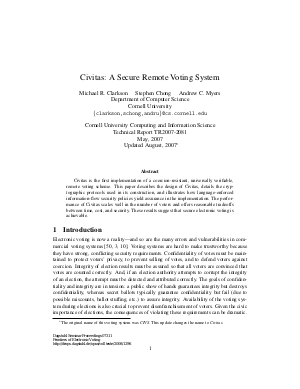Civitas: A Secure Remote Voting System
Authors Michael Clarkson, Stephen Chong, Andrew Myers
-
Part of:
Volume:
Dagstuhl Seminar Proceedings, Volume 7311
Part of: Series: Dagstuhl Seminar Proceedings (DagSemProc) - License:
 Creative Commons Attribution 4.0 International license
Creative Commons Attribution 4.0 International license
- Publication Date: 2008-01-15
File

PDF
DagSemProc.07311.5.pdf
- Filesize: 309 kB
- 47 pages
Document Identifiers
Subject Classification
Keywords
- Electronic voting
- coercion resistance
- voter registration
- secure bulletin boards
- cryptographic protocols
Metrics
- Access Statistics
-
Total Accesses (updated on a weekly basis)
0PDF Downloads0Metadata Views
Abstract
Civitas is the first implementation of a coercion-resistant, universally verifiable, remote voting scheme. This paper describes the design of Civitas, details the cryptographic protocols used in its construction, and illustrates how language-enforced information-flow security policies yield assurance in the implementation. The performance of Civitas scales well in the number of voters and offers reasonable tradeoffs between time, cost, and security. These results suggest that secure electronic voting is achievable. The name of this system as presented at Dagstuhl was CIVS. In August 2007, the name was changed to Civitas. For more information, see the Civitas website at http://www.cs.cornell.edu/projects/civitas.
Cite As Get BibTex
Michael Clarkson, Stephen Chong, and Andrew Myers. Civitas: A Secure Remote Voting System. In Frontiers of Electronic Voting. Dagstuhl Seminar Proceedings, Volume 7311, pp. 1-47, Schloss Dagstuhl – Leibniz-Zentrum für Informatik (2008)
https://doi.org/10.4230/DagSemProc.07311.5
BibTex
@InProceedings{clarkson_et_al:DagSemProc.07311.5,
author = {Clarkson, Michael and Chong, Stephen and Myers, Andrew},
title = {{Civitas: A Secure Remote Voting System}},
booktitle = {Frontiers of Electronic Voting},
pages = {1--47},
series = {Dagstuhl Seminar Proceedings (DagSemProc)},
ISSN = {1862-4405},
year = {2008},
volume = {7311},
editor = {David Chaum and Miroslaw Kutylowski and Ronald L. Rivest and Peter Y. A. Ryan},
publisher = {Schloss Dagstuhl -- Leibniz-Zentrum f{\"u}r Informatik},
address = {Dagstuhl, Germany},
URL = {https://drops.dagstuhl.de/entities/document/10.4230/DagSemProc.07311.5},
URN = {urn:nbn:de:0030-drops-12960},
doi = {10.4230/DagSemProc.07311.5},
annote = {Keywords: Electronic voting, coercion resistance, voter registration, secure bulletin boards, cryptographic protocols}
}
